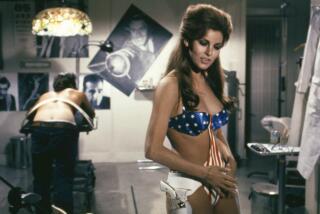‘Winning’ team
- Share via
Anyone who wants to understand the most admired and imitated corporate leader of our time has only to pay attention. During his 21 years as chairman and chief executive of General Electric Co., Jack Welch was focused on running a phenomenally successful global corporation, spearheading expansion into more than 15 major businesses, including gas turbines, financial services and television. When he gave speeches, it was usually to some of GE’s 300,000-plus employees.
But since his retirement 3 1/2 years ago, he’s been sharing the analytical wealth. He’s traveled around the world, talking to audiences of career climbers and business students. And Welch’s management philosophy has been clearly laid out in his new bestselling book, “Winning,” co-authored by his new, third wife, Suzy Welch.
Anyone who wants to understand why the married, mythic former chief executive got entangled in a messy and very public love affair shortly after retiring could turn to the chapter on hiring: “What Winners Are Made Of.” Enlightenment can be found there because the qualities Welch attributes to great leaders -- authenticity, resilience, foresight and candor -- guide his personal life as well, for better or worse.
A year after their wedding, Jack and Suzy Welch are on a national tour to promote “Winning.” In Los Angeles, their dawn-to-dusk schedule is grueling, but two nights in an oasis of a suite at the Hotel Bel-Air and city-hopping in the GE jet helps.
The couple met late in 2001, when his memoir had just been published and she interviewed him for a story in the Harvard Business Review. Suzy Wetlaufer was then the 42-year-old editor of the management bible and the divorced mother of four; Welch was 66 and had been married for 13 years.
In their secluded cottage at the hotel last week, she tells some parts of their story, he runs with others, his pale blue eyes sparkling as he gazes her way. She has honey-colored skin, almond-shaped eyes and an aquiline nose. Her outfit, butter linen slacks and a matching nubby-knit shell, is demure compared with the raucous diamond on her left hand.
From the beginning, their attraction was immediate, the couple says. The relationship remained professional at first, but by the beginning of 2002, they were seriously smitten. Soon, they were aware reporters were on their trail. “The day in March before our story came out in the Wall Street Journal,” Suzy Welch recalls, “Jack said to me, ‘We have a finger over the detonator button of our lives. Let’s do it.’ We knew we couldn’t fake it. It was a massive love.”
The key trait of a leader is authenticity, Welch writes in his new book. “A leader in times of crisis can’t have an iota of fakeness in him.... A person cannot make hard decisions, [or] hold unpopular positions ... unless he knows who he is and feels comfortable with that.” After meeting Wetlaufer, Welch was a man besotted. He didn’t pretend to be anything else.
Their affair moved quickly into the gossip columns and glossy magazines. Vanity Fair’s story on Wetlaufer was nasty. New York magazine’s even worse.
Hell hath no fury like a divorce lawyer with press contacts in his PDA. Before a confidential settlement was reached, Welch’s former wife’s attorney leaked details of the perks Welch continued to receive from GE after retiring, although they’d been negotiated in the mid-’90s as part of a retention contract.
“For a while, Welch got swept into the vortex of other corporate scandals,” says Robert Slater, who has written four books about GE’s business strategies. “It was the age of Enron, WorldCom and Tyco. The media and the meaner analysts tried to make Welch’s compensation and what the more scurrilous CEOs did equivalent.”
Welch had built what many considered the world’s greatest company and made scores of employees and stockholders rich, so it’s arguable whether his compensation was excessive. But to end the controversy, he paid GE for use of its Boeing 737 and other niceties since his retirement, and continues to do so.
As if Welch’s turmoil weren’t enough, Wetlaufer knew she had to tell her boss at the Harvard Business Review about the romance. Although she insisted her interview with Welch be pulled from the magazine, she was demoted and eventually asked to resign.
There are only so many movie stars coupling and uncoupling at a given moment, so when a near billionaire gets involved with a charismatic younger woman with a high-profile job, that’s worthy of a snicker or two. And the media are nothing if not self-referential, a circumstance that lifted, or sank, the brouhaha to another level.
To some journalists, one of their own had crossed an ethical line. To others, she had achieved fulfillment of their secret wishes. After all, how many Esquire and Details writers have confessed the fond hope that the starlet they’ve interviewed might fall for an ink-stained wretch?
As snarky as the press got, Welch had publicly taken heat before. At GE, his strategy was to fix, sell or close every underperforming business under the company’s umbrella. In his first five years as chief executive, he downsized so many employees that he earned the nickname “Neutron Jack,” after the bomb that leaves buildings standing but kills people. But this time the attacks were personal.
Great leaders, Welch writes, have “a strong penchant to surround themselves with people better and smarter than they are.” A graduate of Harvard and the Harvard Business School with experience as a management consultant, journalist and editor, Suzy Welch says, “Even if I hadn’t had a personal relationship with Jack, I would have been the perfect person to write a book like this with him.”
They worked on the book for a year at the 20,000-square-foot rented Boston town house they share with her 10-year-old daughter and 12-year-old son (her 14- and 16-year-olds are at boarding school). Parts of the manuscript were refined at Welch’s five other homes, including one on Nantucket. A second Nantucket house is often used by his nine grandchildren and four grown children from his 28-year first marriage.
Collecting brainiacs works. “Suzy helped me codify what I knew instinctively,” Welch says. She drew out his reality-tested concepts about candor, rewarding performance and eliminating mediocrity. They approached the book with mutual obsessiveness. Without a deadline, they’d still be tweaking the material. And there’s more. “I really love her heart, and I saw it in the first days,” he says. “It’s an incredible thing to be with somebody who’s not cynical about the world.”
Inevitably, promoting the new book brings up the old scandals again. Why risk that? Resilience is another quality Welch considers essential. He even calls it “heavy-duty resilience,” the ability to get back in the saddle after being knocked down. A leader gets going again, he writes, “with renewed speed, conviction and confidence.”
Consider that from 1981, when Welch became chief executive, until he announced his retirement in 2001, GE stock multiplied nearly 50 fold. Such results aren’t achieved unless a leader is highly competitive.
“I’m not here hawking books to make a living,” Welch told a crowd at UCLA. (Profits from sales of “Winning” will go to charity.) The man who didn’t want GE to own any business that couldn’t be No. 1 or 2 in its market, and the woman who led the expansion of the country’s most prestigious academic business journal from six to 12 issues a year, want to win.
Their book, which Newsweek judged “smart, practical and not afraid to address tough subjects,” is at the top of the Wall Street Journal’s bestseller list, second on the New York Times list of advice books and ranked fifth among nonfiction titles by the Los Angeles Times.
“Obviously, the notoriety of our relationship has helped the book,” Welch says, smiling at the rocky road he traveled to the cover of a recent Newsweek. “When we were going through the terrible times, we never had a fight. I’d go through 20 more storms to get what we have now.”
He saw it coming, of course, because leaders, he writes, have “a vision and the ability to predict the future ... to see around corners.” He envisioned a tempest but saw no other route to bliss. She didn’t think they’d be such hot copy. “You met another woman, you got divorced,” she says. “You’re not the first man who’s had this happen.” They knew that in time, Ben and Jen or Brad and the other Jen would take the spotlight.
Their union hasn’t achieved universal acceptance as a fairy tale -- she was too professionally successful and financially comfortable to pass for a scullery maid; he was hardly a lonely little prince. Yet at book signings people tell them, “You give us hope” and “We love your love story.” The former Mrs. Welch might not agree, but some days it seems that all the world loves a lover. “The people who get it are people who believe in love, believe in possibilities,” Suzy Welch says.
The business press sometimes referred to Welch as “the rock star CEO,” which might have the ring of journalistic hyperbole -- until you see the mobs he attracts. At Vroman’s Bookstore in Pasadena in late April, patient hordes stood in line for more than three hours to meet him and get an autographed copy of “Winning.” Crowds at signing sessions at UCLA and at USC’s Marshall School of Business were just as zealous.
For more than an hour, Welch responded to questions from a standing-room-only audience at the UCLA Anderson School of Management. He routinely substitutes such volleys for formal presentations and enjoys the challenge of thinking on his feet.
“How can a company find and develop leaders?”
“What’s your best advice on how to get the next job?”
“What can I do about a bad boss?”
“How can a multinational company handle cultural differences?”
Welch was quick, blunt and funny, but not at the expense of substance. He rephrased a rambling rant about high executive compensation as, “Why do CEOs get so much damn money?” then launched into praise for the free-market system and a denunciation of giving big severance payments to executives who’ve bombed. If corporations would pay attention to grooming future leaders, he said, they wouldn’t get stuck offering golden parachutes to lure talent.
Nearly everyone in the line that inched toward Welch after the assembly sought more than an autograph. In turn, they inquired about subjects macro and micro. Driven by innate curiosity, Welch has a way of making even brief encounters mutually satisfying: He focuses on every individual with an intensity that makes him or her feel interesting and important. Herbert Jalowsky, an alumnus who traveled from Tucson to consult the oracle, says, “He acted like he would have happily talked to me as long as I wanted, if a hundred people weren’t behind me in line.”
Such is the Jack Welch effect.
More to Read
Sign up for our Book Club newsletter
Get the latest news, events and more from the Los Angeles Times Book Club, and help us get L.A. reading and talking.
You may occasionally receive promotional content from the Los Angeles Times.










